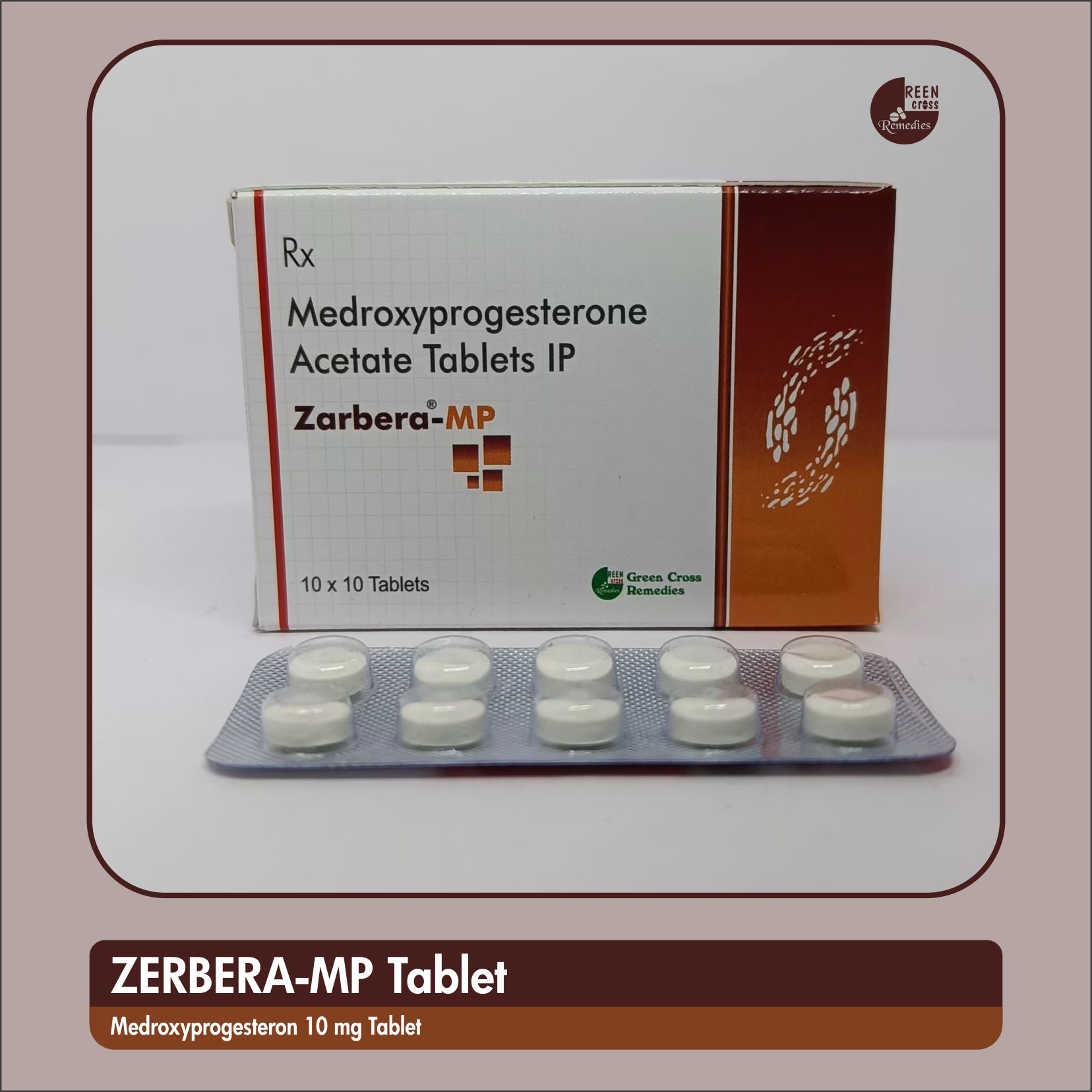ZARBERA MP Tablet

Medroxyprogesteron 10 mg Tablet Use, Indication, Side Effects, Dosage, Mechanism of Action, Price, Contra-Indications, Drug Interactions..
ZARBERA MP Tablet (Medroxyprogesterone 10 mg)
Medroxyprogesterone is a progestin (a form of progesterone), a female hormone that helps regulate ovulation (the release of an egg from an ovary) and menstrual periods. Medroxyprogesterone is used to treat conditions such as absent or irregular menstrual periods, or abnormal uterine bleeding
Use and Indications:
Medroxyprogesterone 10 mg (ZARBERA MP) is used for several medical conditions, including:
- Contraception:
- Medroxyprogesterone is commonly used in its injectable form for long-term birth control (Depo-Provera), but in tablet form, it can be used as a part of hormone therapy for contraception.
- Menstrual Irregularities:
- Medroxyprogesterone is used to treat irregular menstruation, absent periods (amenorrhea), or abnormal bleeding, especially in women with hormonal imbalances.
- Endometriosis:
- It is sometimes used to manage the symptoms of endometriosis, a condition where tissue similar to the lining of the uterus grows outside of the uterus.
- Menopausal Symptoms:
- Medroxyprogesterone can be used as part of hormone replacement therapy (HRT) to balance estrogen effects in postmenopausal women, reducing the risk of endometrial hyperplasia caused by unopposed estrogen.
- Abnormal Uterine Bleeding:
- It is used to treat abnormal uterine bleeding due to hormonal imbalance.
- Hormone Therapy for Breast Cancer:
- Medroxyprogesterone is sometimes used as part of the treatment for certain types of breast cancer, particularly in premenopausal women.
Mechanism of Action:
Medroxyprogesterone is a synthetic form of progesterone. It works by mimicking the effects of the natural hormone progesterone in the body. The mechanism of action includes:
- Inhibition of Ovulation: Medroxyprogesterone can prevent ovulation (the release of an egg from the ovary), which is a key aspect of its contraceptive effect.
- Endometrial Changes: It promotes changes in the endometrium (the uterine lining), making it less receptive to implantation, which is beneficial for its contraceptive use.
- Anti-Estrogenic Effects: It counteracts the effects of estrogen in the body, which can be helpful in treating conditions like endometriosis or abnormal uterine bleeding.
- Thickening of Cervical Mucus: It thickens the mucus in the cervix, making it more difficult for sperm to enter the uterus, further contributing to its contraceptive action.
Dosage:
The typical dosage of ZARBERA MP Tablet (Medroxyprogesterone 10 mg) depends on the condition being treated:
- For Contraception: Medroxyprogesterone is typically taken once daily. The specific regimen depends on the individual’s health and doctor’s advice.
- For Irregular Periods or Amenorrhea: Usually taken 10 mg daily for 5-10 days depending on the specific treatment protocol prescribed by a healthcare provider.
- For Endometriosis: Often prescribed as part of a specific hormonal treatment regimen; doses typically range from 10 mg to 20 mg daily for several weeks or months.
- For Hormonal Replacement Therapy: When combined with estrogen, the typical dose is 5 to 10 mg daily for 10 to 12 days each month.
Always follow your healthcare provider’s directions on dosage and duration.
Side Effects:
While Medroxyprogesterone is effective for the conditions it treats, it can cause side effects. Some common and serious side effects include:
- Common Side Effects:
- Weight gain
- Mood swings or depression
- Headaches
- Nausea
- Breast tenderness
- Dizziness
- Changes in menstrual cycle (e.g., spotting, amenorrhea)
- Serious Side Effects:
- Increased risk of blood clots (deep vein thrombosis, pulmonary embolism)
- Increased risk of stroke or heart attack in women with certain risk factors (e.g., smoking, age over 35).
- Liver issues, such as jaundice or hepatitis.
- Breast cancer (particularly with long-term use in combination with estrogen).
- Mood changes or symptoms of depression, especially in those with a history of depression.
- Changes in bone density with long-term use, leading to possible osteoporosis.
Contraindications:
Medroxyprogesterone should not be used in the following situations:
- Hypersensitivity: If you are allergic to medroxyprogesterone or any of its components.
- Pregnancy: Medroxyprogesterone should not be used during pregnancy as it may harm the fetus.
- Active or History of Blood Clots: Women with a history of blood clots (e.g., deep vein thrombosis or pulmonary embolism) should not take this medication.
- Liver Disease: People with active liver disease (such as hepatitis or cirrhosis) should avoid this medication.
- Unexplained Vaginal Bleeding: Medroxyprogesterone is contraindicated in cases of unexplained vaginal bleeding until the cause is determined.
- Breast Cancer: Active breast cancer or a history of breast cancer is a contraindication.
Drug Interactions:
Medroxyprogesterone may interact with other medications. Some significant interactions include:
- Anticonvulsants (e.g., phenytoin, carbamazepine): These drugs may reduce the effectiveness of medroxyprogesterone by affecting its metabolism.
- Antibiotics (e.g., rifampin): Rifampin can reduce the effectiveness of Medroxyprogesterone by increasing its breakdown in the liver.
- Corticosteroids: Concurrent use of corticosteroids may increase the risk of fluid retention and other side effects.
- Warfarin (Blood Thinner): Medroxyprogesterone may alter the effects of anticoagulants, necessitating careful monitoring of blood clotting parameters.
- Estrogen: In hormone replacement therapy, caution is required when combining medroxyprogesterone with estrogen, as it may increase the risk of certain side effects.
Always inform your doctor about all other medications you are taking to avoid adverse interactions.
For Use of Registered Medical Practitioner or A Hospital Only

